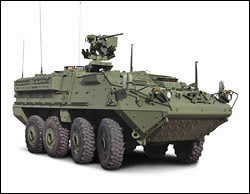Artillery Soldiers accomplish it all
while in Iraq
[Link to Article]
By Spc. Gretel Sharpee
The United States Army and its Soldiers remain the strongest fighting force in the world due to it’s flexibility to accommodate a changing battlefield. Nowhere is this flexibility more apparent than in field artillery units that are currently deployed overseas, like the 1st Battalion, 37th Field Artillery, 3rd Brigade, 2nd Infantry Division, (Stryker Brigade Combat Team), who is making FOB Endurance their last stop before they redeploy to the states.
The 1-37th, out of Fort Lewis, Wash., has spent the last 10 months serving in Iraq in three key locations, Samarra, Mosul and Qayarrah in operations that involved more than artillery efforts. They are one of the many artillery units that have been challenged to adapt to a battlefield that may not require their artillery skills, but does require their excellent Soldiering skills.
Deployed to Iraq in November of 2003, the 1-37th began their deployment in Samarra doing exactly what they are trained to do, by, “putting lead down range.” While based in Samarra, these artillery Soldiers conducted fire missions against anti-Iraqi forces who were launching mortars against Multinational Forces Soldiers stationed in the area. The 1-37th is able to boast an average time on target of less than 10 minutes, which for an artilleryman in a combat zone is an accomplishment where speed and accuracy is important in saving the lives of the Soldiers operating around them.
“The proudest moment for an artillery commander is when there are mortar rounds coming in and while everyone runs for bunkers, your Soldiers are running into position to initiate counter fire,” said Capt. Dave Kenney, Headquarters Support Battery executive officer. “We saw our Soldiers do that in Samarra, and we saw them rise to the challenge of every mission since then… that is a credit to each individual Soldier in this battalion.”
While in Samarra they demonstrated their skills on their weapon of choice, a M198 Howitzer gun system, it was then that they began to realize that their mission would be much broader than serving as artillery Soldiers.
During their five-week stay in the city within the Sunni Triangle, Battery C, 1-37th Soldiers were also tasked with constructing and maintaining a detention holding facility for anti-Iraqi forces that were captured in the area by other elements of the 3rd Brigade.
When the battalion and elements of 3rd Brigade moved to Mosul, the largest and most densely populated city in northern Iraq, to take over operations from the 101st Airborne Division (Air Assault), it became quickly apparent that artillery fire was not going to be the best course of action to fight the enemy in the urban terrain in and around Mosul.
Adapting to their new operations that had changed from a counter mortar mission to a security and stability operation, Soldiers of the 1-37th were responsible for providing security patrols and visits in two districts and 10 sub-districts in the Ninevah Province.
“It was nice to work within the villages in the Ninevah Province,” said Sgt. Christopher Primrose, fire direction center operator in Battery A, 1-37th. “It gave me a chance to get out and see the people that live here, that we are, in a way working for.”
The 1-37th remained a valuable force in the area, providing security and stability operations on the city streets as well as on the military operating bases in and around Mosul. They conducted convoy escort operations, moving elements of Multinational Forces throughout the area of operation safely.
In the five months the Battalion spent operating out of FOB Marez and FOB Freedom in the city of Mosul, they conducted five cordon and knock operations resulting in the detention of numerous detainees and the confiscation of several weapons and munitions. Several of these operations were conducted in partnership with the developing Iraqi National Guard (ING) and Iraqi Police (IP), who are crucial to Iraq’s independent security operations.
Joint operations with the ING and IP elements included providing convoy security for fuel trucks. The Soldiers escorted 75,000 Turkish fuel trucks transporting fuel valued at $1 billion that was distributed throughout northern Iraq. Oil is Iraq’s most valuable export, making the security of these fuel trucks a critical element for Iraq’s fledgling economy. Months and billions of dollars could have been lost in the progression of Iraq’s economy if the 1-37th, IP and ING hadn’t provided security.
Because the 1-37th continued to demonstrate flexibility and adaptability, they were again called upon to take on a mission that was far from what their artillery training had prepared them for.
They moved to Qayarrah in June, about 120 miles south of Mosul, changing their location to FOB Endurance, but never changing the mission of providing security and stability to the area.
In addition to providing security to the Qayarrah area, the 1-37th was also tasked to train Iraqi National Guard soldiers. Once the ING soldiers graduated from their five-week initial training, they participated in the cordon and search operations that the 1-37th continued to conduct in the surrounding area.
Soldiers in the 1-37th taught the ING everything from searching techniques to basic leadership and soldiering skills. This ongoing training is the next step in securing the future of Iraq’s security forces.
“We have had to adapt to new tasks in our mission over here,” said Sgt. Trevor Kinzel, Field Artillery Surveyor, HSB, 1-37th. “But this mission will go on after we leave here too, which is where the Iraqi soldiers come in.”
All of the Soldiers in the 1-37th have done what needs to be done to complete the mission since they arrived in Iraq 10 months ago. It is this dedication that has brought them together resulting in mission accomplishment.
“I am very proud of my Soldiers,” said Lt Col. Steve Sliwa, 1-37th Battalion Commander. “They have stayed flexible during our ever-changing mission and have shown they are capable and prepared to do whatever the mission requires them to do.”
~*~















